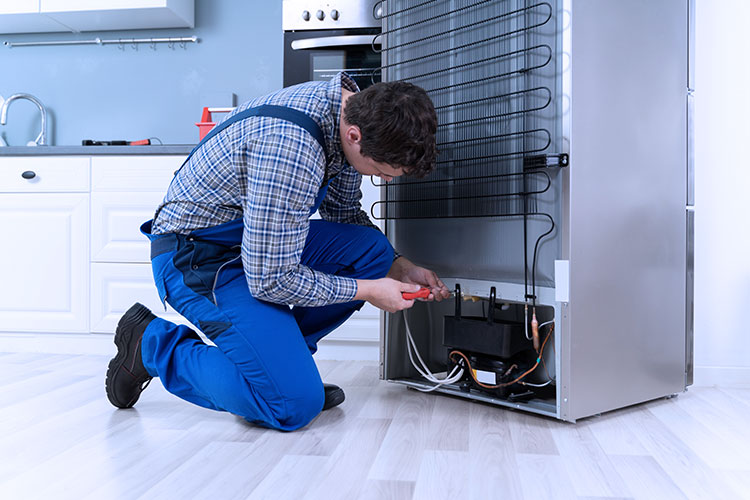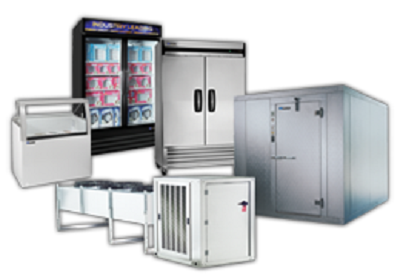Essential Tips for Effective Ref Repair Work to Extend Device Life Expectancy
When it comes to your fridge, proper repair work and maintenance are essential for long life. Recognizing usual troubles and knowing when to act can make all the distinction.
Comprehending Usual Refrigerator Troubles
Refrigerators are important in keeping your food fresh, but they can encounter a series of common problems that interrupt their performance. One regular issue is inadequate cooling. If you notice food spoiling quicker than normal, examine the thermostat settings or consider if the door seals are damaged. Another usual problem is extreme sound, which might show a malfunctioning compressor or a failing fan. You could also experience water pooling inside or beneath the fridge; this typically arises from a blocked defrost drain or a damaged water line. Additionally, if your fridge's light isn't working, it can be an easy light bulb issue or a trouble with the door button. Finally, ice build-up in the freezer can hinder air movement and cooling performance. Acknowledging these concerns early can save you time and money in repair services, ensuring your fridge runs smoothly and successfully.
Normal Upkeep Practices
To maintain your appliances running smoothly, you need to remain on top of routine upkeep methods. Tidy the condenser coils, check the door seals, and keep an eye on the temperature level settings to ensure peak performance. These straightforward tasks can conserve you money and time on repair work down the line.
Clean Condenser Coils Frequently
Cleaning your condenser coils regularly can substantially boost your device's performance. Dirt and dust develop on these coils gradually, triggering your home appliance to work more challenging and take in even more energy. To keep them clean, unplug your device and carefully eliminate any kind of safety covers. Use a vacuum with a brush add-on or a soft brush to carefully get rid of particles. If required, a mix of cozy water and light detergent can help remove stubborn grime. Make certain to allow whatever dry totally before reassembling and connecting the home appliance back in. Objective to cleanse your coils a minimum of two times a year, or more frequently if you have pets or reside in a dirty setting. This easy job can expand the life expectancy of your home appliance significantly.
Check Door Seals
Three straightforward steps can aid you assure your home appliance's door seals remain in excellent problem. Examine the seals on a regular basis for any kind of cracks, splits, or signs of wear. These problems can cause air leaks, affecting effectiveness. 2nd, clean the seals making use of cozy, soapy water to get rid of any type of debris or gunk. A tidy seal guarantees a limited fit and better performance. Perform a straightforward test by closing the door on an item of paper. If you can easily draw it out without resistance, the seal might require replacing. By following these actions, you'll keep your device's efficiency and longevity, conserving you cash on power bills and repairs in the future.
Monitor Temperature Level Setups
Routinely checking your home appliance's temperature level setups is important for ideal efficiency and efficiency. Whether you're handling a fridge, fridge freezer, or stove, keeping an eye on these setups can protect against lots of problems. For refrigerators, objective for temperatures in between 35 ° F and 38 ° F; for freezers, remain 0 ° F. If the temperatures are expensive or reduced, your device may work harder, throwing away energy and shortening its life expectancy. Utilize a thermostat to inspect these setups frequently, especially after significant adjustments, like moving your device or readjusting the thermostat. If you see changes, change the setups appropriately and speak with the customer handbook for guidance. By staying positive about temperature level surveillance, you'll guarantee your devices run smoothly and last much longer.
Fixing Cooling Concerns
When your refrigerator isn't cooling appropriately, it can result in spoiled food and squandered cash, so addressing the issue promptly is essential. Start by examining the temperature level settings to confirm they go to the suggested degrees, generally around 37 ° F for the refrigerator and 0 ° F for the freezer. If the setups are right, evaluate the door seals for any spaces or damages; a defective seal can enable cozy air to get in.
Following, analyze the vents inside the refrigerator and fridge freezer. Confirm they're not obstructed by food products, as this can interrupt airflow. Listen for the compressor; if it's not running or making unusual sounds, it might require interest. Finally, inspect the condenser coils, usually located at the back or bottom of the device. Dirt and particles can collect, causing cooling issues. Clean them with a vacuum or brush to optimize performance. If issues linger, it could be time to call a professional.
Repairing Water Leak and Ice Build-Up
If you're taking care of water leakage or ice build-up in your home appliance, it's important to determine the resource of the issue. By determining where the water is coming from, you can prevent additional concerns and get redirected here prevent expensive repairs. Allow's explore some efficient approaches to tackle these common troubles.
Recognize Leak Resources
Just how can you efficiently identify the sources of water leak and ice accumulation in your appliances? Begin by examining the seals and gaskets on your fridge and freezer doors. A worn or damaged seal can permit cozy air to enter, triggering condensation and ice. Next, inspect the drainpipe pan and drain system for obstructions or blockages; a backed-up drainpipe can cause water merging. Search for any loosened connections in the water system line, which can develop leakages. Check out the defrost drain for ice buildup, which could disrupt proper drainage. By systematically checking these areas, you'll identify the resource of the problem, allowing you to take the essential steps to fix it and expand your appliance's life expectancy.
Protect Against Ice Formation
To avoid ice development in your home appliances, begin by confirming the temperature settings are ideal. If your fridge or fridge freezer is too cool, it can bring about too much ice accumulation. Check the door seals consistently; damaged seals can let warm air in, causing condensation and ice formation.
Keep the device well-ventilated and stay clear of congestion, as this can obstruct air flow - Washing Machine Repair Dependable Refrigeration & Appliance Repair Service. Routinely thaw your fridge freezer if it doesn't have an automatic defrost attribute.
If you see water leak, recognize and deal with any kind of blocked drainage openings, as they can add to ice build-up. Lastly, clean the coils and verify they're operating correctly to preserve peak efficiency. Taking these steps will certainly aid prolong your appliance's life expectancy and efficiency.
Dealing With Noisy Refrigerator Seems
While it could appear startling, a noisy fridge commonly signals small concerns instead of significant malfunctions. Identify the resource of the sound. Common perpetrators consist of the compressor, followers, and water lines. If you hear a humming sound, it could be the compressor striving; this might just be a regular procedure noise.
Next, look for loose items inside. Sometimes, containers or racks can rattle, developing unwanted sound. Tighten up or reposition them to remove the audios.
If you see a clicking sound, it may be the defrost timer. This is typically safe however can suggest it needs evaluation.
Lastly, validate your fridge is level. An unbalanced home appliance can produce vibrations and noise. Utilize a degree to check, and readjust the feet if needed. Resolving these problems immediately can aid maintain your fridge's efficiency and prolong its lifespan.
When to Replace Parts vs. Full Replacement

Nevertheless, if your device is older and experiencing numerous problems, a full substitute might be much more affordable. Take into consideration the expense of repair services versus the appliance's value. If repair services exceed 50% of a new system's rate, it's normally better to buy a replacement. Furthermore, if you see recurring troubles that keep persisting, it's a sign that your home appliance has reached the end of its life. ice machine repair service Consider these aspects meticulously to make the ideal decision for your demands and budget plan.
Knowing When to Call an Expert
Just how can you inform when it's time to call in an expert for appliance repair work? If your home appliance quits functioning completely or regularly journeys circuit breakers, it's an additional red flag.
You must likewise consider your own convenience degree with fixings. If you're uncertain about identifying the trouble or lack the right tools, it's finest to connect for assistance. Remember, trying complicated repair services can bring about even more damage and even security risks.

Frequently Asked Questions
Just how Often Should I Clean the Refrigerator Coils?
You need to clean your fridge coils every six months. This aids maintain efficiency and protects against overheating. If you observe extreme dust or pet hair, clean them a lot more frequently to ensure your refrigerator runs efficiently.

Can I Use Vinegar for Cleaning My Fridge?
Yes, you can utilize vinegar to clean your refrigerator! It's a superb natural cleanser that eliminates odors and spots. Dependable Refrigeration & Appliance Repair Service LG Appliance Repair. Just blend it with water, use it to surface areas, and clean down for a fresh, clean fridge
What Temperature Should My Refrigerator Be Ready To?
You ought to establish your fridge to 37 ° F(3 ° C) for excellent food preservation. This temperature keeps your food fresh while Check This Out stopping putridity, guaranteeing your groceries last longer and reducing waste. It's an easy adjustment you can make!
Does a Refrigerator Need to Be Leveled?
Yes, your fridge needs to be leveled. If it's irregular, it can affect cooling performance and trigger excess noise. Inspect the leveling legs and readjust them to guarantee correct equilibrium for suitable efficiency.
Exactly How Can I Lower Fridge Power Usage?
To lower your refrigerator's energy intake, maintain it tidy and well-ventilated, inspect door seals for leaks, established the temperature in between 35-38 ° F, and stay clear of straining it. These steps can considerably lower your power expenses.